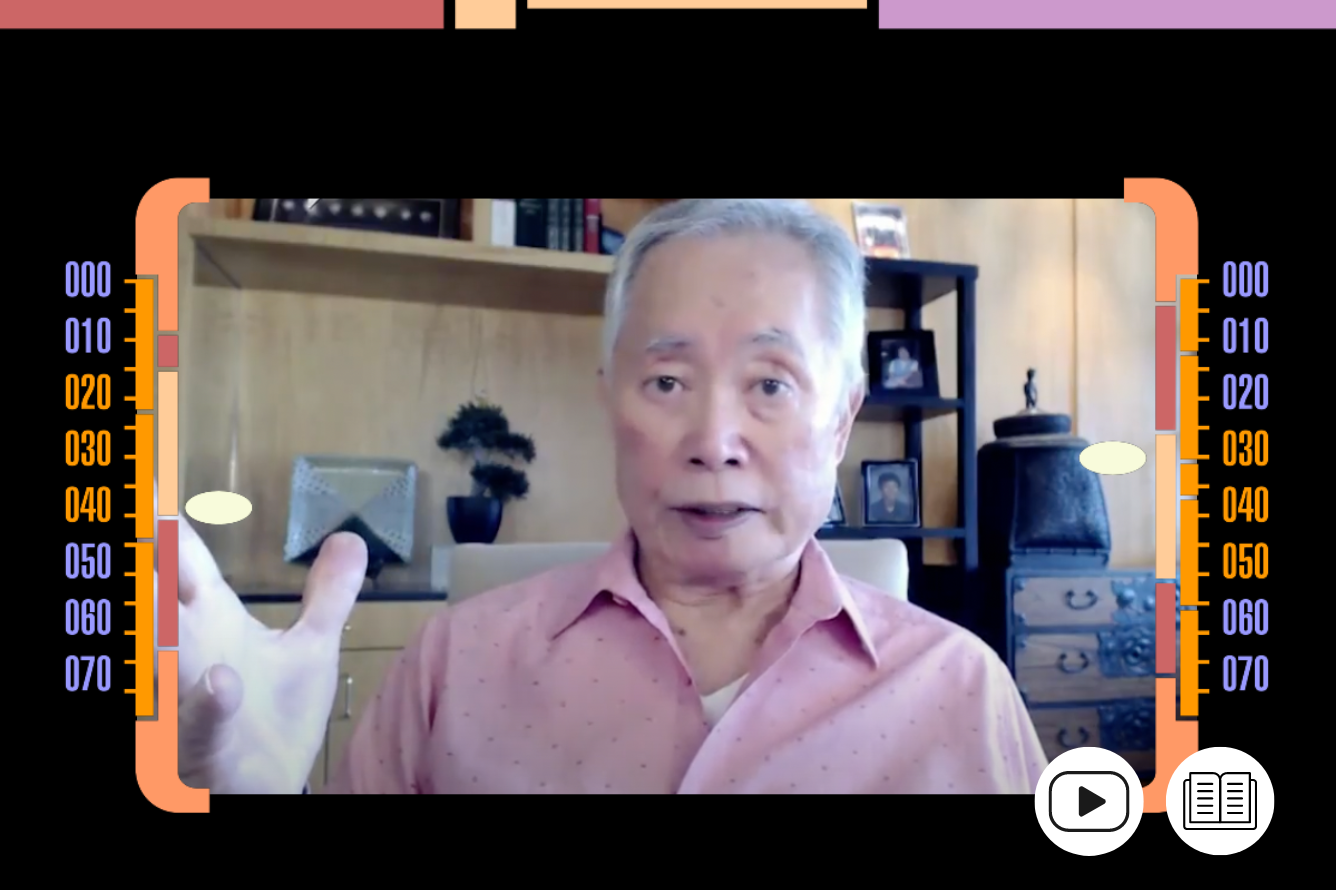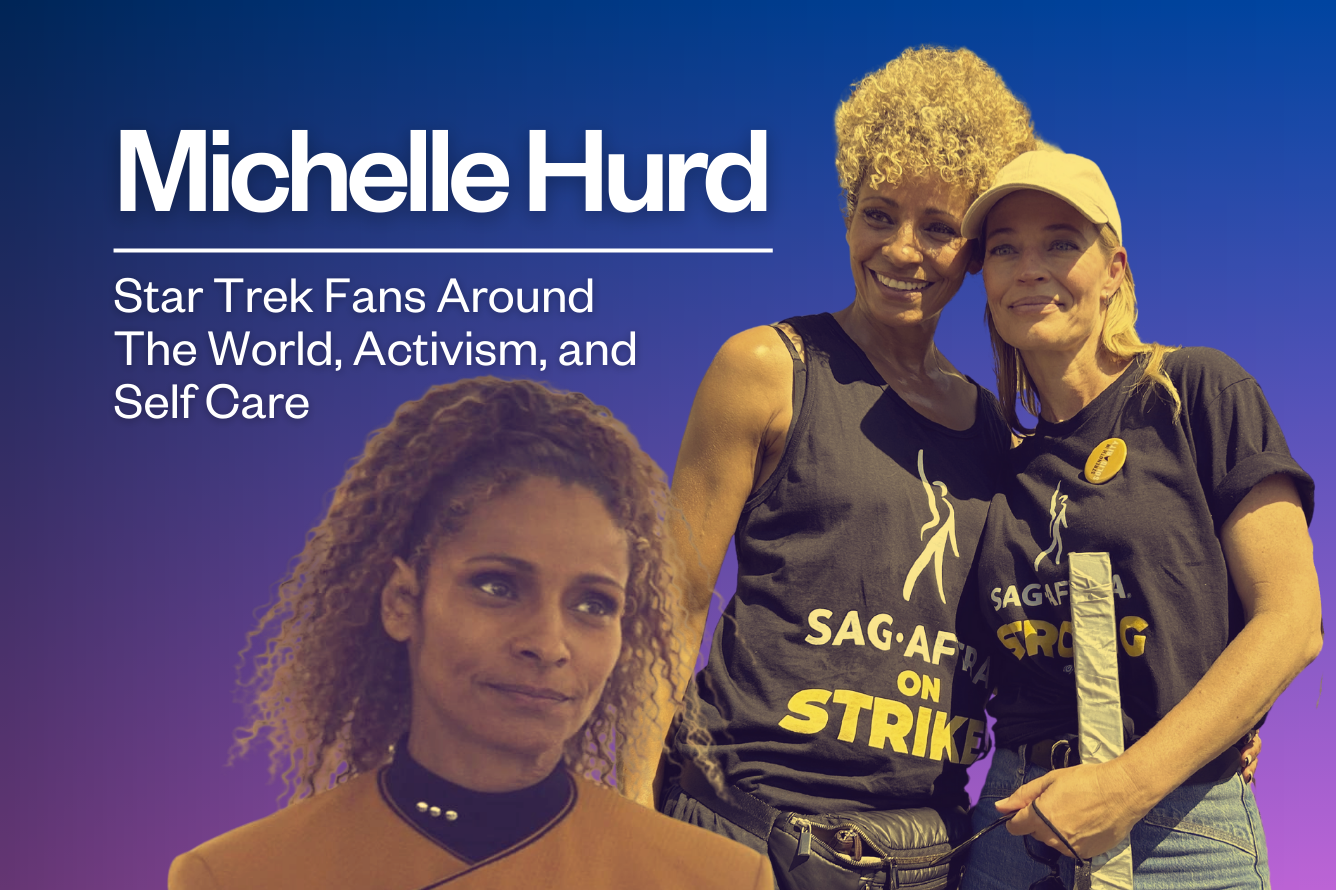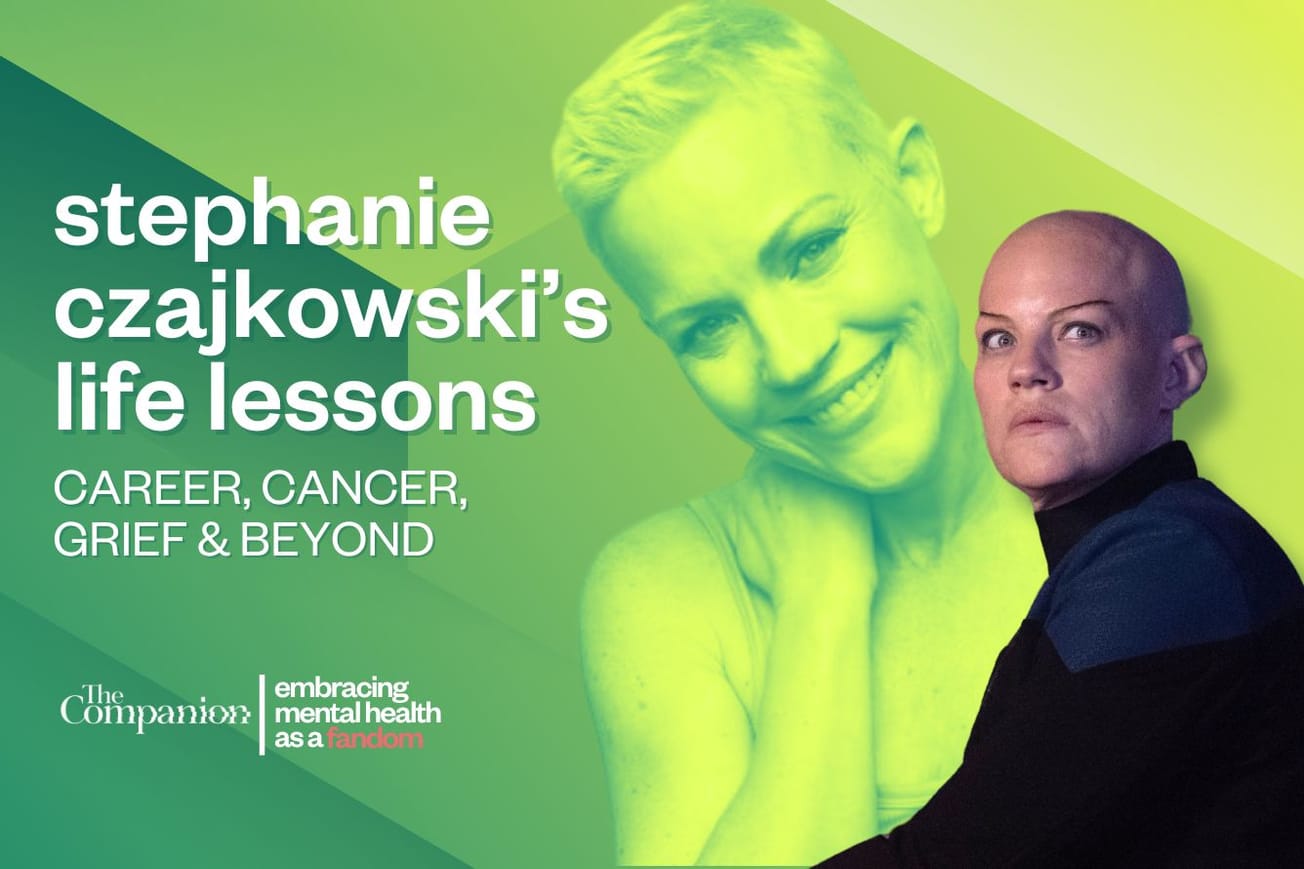It’ll never be said that Ian Spelling shies away from the difficult questions whilst hosting To Boldly Ask….
The George Takei of today is an outspoken voice for gay rights, but whilst his Star Trek career shattered boundaries in so many ways his sexuality was a secret. For almost four decades from 1966 – three seasons of Star Trek: The Original Series, two seasons of Star Trek: The Animated Series, five movies, and numerous video games – George Takei presented as straight.
Star Trek, as we’ve discussed numerous times on The Companion, has had until very recently a limit to its infinite diversity. Star Trek in 2022 is making up for lost time with openly queer characters and openly queer talent. This is where the fearless questioning of Ian Spelling comes in: is he jealous of the opportunities enjoyed by queer actors like Blu del Barrio, Ian Alexander, Wilson Cruz, and Anthony Rapp to tell queer stories in modern Star Trek?
“Not jealousy because I wouldn't be competing for the same morals,” says Takei. “I recognize the passage of time. I lived in my time, and they're living in their time, and in some small way, I contributed to their being able to live in their time, which is what we are enjoying today. It was survival. I passionately loved acting, and I wanted an acting career. And I knew I could not have it if it were known that I was gay. So as a survival thing, I was closeted.
“I'm an activist, I was active in the civil rights movement of African Americans campaigning for equality. I was active in the peace movement during the Vietnam War and by that time, I had a thriving career. So I joined a Hollywood peace movement called the Entertainment Industry for Peace and Justice – EIPJ – where I work together with people like Jane Fonda and Donald Sutherland, particularly with Jane.
“I was involved in all these other social issues but the one issue that was closest to me, most personal to me, I had to keep hidden. Believe me, that was not easy. In fact, it was painful because there were people that gave everything up their jobs, their careers, some lost their families, and they were campaigning for my equality, and to remain quiet during all that was torturous.”
George Takei Joins the Fight for Gay Rights
Takei’s decision to come out in 2005 came as a result of what he acknowledges as the selfless work of queer activists who managed to pass Assembly Bill 19 (AB 19), legalizing same-sex marriage, in the California Senate and California State Assembly. It seemed like the battle for equality had been all but won, and when it fell apart at the final state, that was the sign Takei needed to join the fight.

“It was a landmark event,” he recalled, “which needed just one more vote, that of the governor, who happened to be a movie star at that time, Arnold Schwarzenegger. When he campaigned for the governor's seat, he campaigned by saying, ‘I'm from Hollywood, I've worked with gays and lesbians. Some of my friends are gays and lesbians.’ So persuaded by that campaign rhetoric, some of my gay friends did vote for him. When the marriage equality bill was passed by both houses of our legislature, they thought Arnold was going to sign it. I was skeptical because his base is the arch-conservative right wing. And sure enough, when the bill landed on his desk, he vetoed it. I was raging angry. I assessed my career and the rest of my life, and I thought, I had a good enough career. Brad [his husband] and I discussed it and we decided, all right, I am going to come out.
“I spoke to the press for the first time as a gay man. I blasted Arnold Schwarzenegger’s veto. And from there, and then I teamed up with the Human Rights Campaign, an LGBTQ lobbying organization in Washington, DC, and they arranged a nationwide speaking tour. I've been out and campaigning, vigorously lobbying the Congress people and making some achievements, but most of my adult life was spent in the closet.”
The Incredible Allyship of Nichelle Nichols
With his background in activism, informed by his early experiences of prejudice during the internment of Japanese-Americans in the Second World War, Takei struck up an early friendship with the late Nichelle Nichols, who played comms officer Nyota Uhura. The two represented the new-look inclusive Enterprise of ‘The Man Trap’ (S1, Ep1) – the first broadcast (sixth filmed) episode following the studio's rejection of the cerebral (and very white) pilot, ‘The Cage.’
It was a statement of intent to give the show an African American voice only a year on from the end of Jim Crow and an Asian American voice at a time when blood was being shed in Vietnam, and conflicts in Korea and the Pacific theater of the Second World War were a national scar. At a time when much of the United States wanted to turn destructively inwards, the cast of ‘The Man Trap’ took their hands and led them outwards and upwards into a better tomorrow.

“When I first met her,” said Takei, “I was doing a civil rights musical called Fly Blackbird in Los Angeles. It ran for 11 months in Los Angeles, which was considered a big hit. During the end of that run, Nichelle came to see the show, and came backstage – she knew a couple of people in the cast. I was stunned [at] first by her beauty. In those days, African American women ‘conked’ their hair, straightening it with chemicals and so forth, and shaping it into the current fashion. Her hair was absolutely proudly natural and was a great huge sphere – a helmet over her head, an enormous helmet, all-natural and frizzy. The way she carried it off with pride, and with dignity and with charm. I just thought, when I was introduced to her, she is an amazing woman. She is an individual and a proud individual.
“I met her again at the table read when we began filming on it. But that was how my relationship – a deep, profound relationship – with Nichelle began. As you know, I've run for public office, and I've put together a lot of fundraising campaigns for various candidates. And I could always call on Nichelle to be the performer, star performer at any of the dinners that we set up. She was a dear, dear friend.”
Nichols was ‘best lady’ opposite Koenig as best man at Takei’s 2008 wedding, but that was an honor she earned four decades earlier when the two were on a convention tour with Koenig and Scotty’s James Doohan.

“It was a convention at Charleston, West Virginia,” Takei recalls. “We were flying into Pittsburgh, and then Pittsburgh to Charleston, and there was an enormous storm happening. We thought we would die, the plane was dropping and then working its way up. It took forever for us to be able to land in Pittsburgh and by the time we landed our connecting flight had taken off, and it was sheer chaos. They said the next flight that they could get for us was the following morning, very early on. So we thought, we'll go to a hotel nearby. But all the hotels were booked up. And so Walter and I were making phones. Jimmy was with us as well. We made phone calls all over the place and the only place that we could get that had vacancies was about 15-20 miles away. We got in the cab and arrived there in the late night hour and we tried to check-in.
“They said, ‘Well, we do have two vacancies but they're each double.’ It was three guys, one gal, Jimmy, Walter, and me, and Nichelle. So we cut strips of paper, and we drew straws and the short straw was drawn by me. So I was planning on being a gentleman. When we walked in, I said, ‘You have a bed – I’ll sleep on the couch.’ And she said, ‘Darling, I know who you are.’ Get your body on this bed. She knew.
“Most of the cast knew because, you know, actors are sophisticated people. When we had our wrap parties, Friday nights, people brought their girlfriends or wives or their husbands or their boyfriends. And the beer would be rolled in and the pizza would be brought in, and we enjoyed each other's company. More often than not, I brought a buddy. So the perceptive ones knew that I was gay. But they didn't say anything, because they knew that it would be damaging to me. So I appreciated that very much. But that was when I knew that Nichelle knew I was who I was. She says, ‘Darling, I know who you are.’”
The Fight for Captain Sulu and USS Excelsior
The unflinching dedication with which Takei has embraced his role as a queer icon may be a relatively recent chapter in the 85-year-old actor’s life, but his sense of reverence for the work he does is anything but recent. He’s long been outspoken about the opportunity the role of Sulu offered to show TV audiences that Asian Americans could be something other than crude caricatures and comedy sidekicks.
Star Trek: The Original Series wasn’t a break in activism, it was activism, and he fought off-camera for Sulu to receive his own command in Star Trek II: The Wrath of Khan (1982).
“Captain Sulu happened because of my lobbying. I'm an activist on political issues, but also for my career. And Sulu was a groundbreaking role for me, and I thought I'd continue tilling that soil. I talked with Gene Roddenberry. I talked with the writing staff and I talked with the directors that passed through about Starfleet: it's supposed to be a meritocracy. With each episode, we were gaining more experience, and then when the movie started, we were all advancing in rank. I became a lieutenant commander. And yet, I was there at the same ol’ helm seat, saying ‘Aye-aye, sir, Warp 3.’ The job was the same, only the title had been changed.
“I said, ‘There's got to be a reflection of what Starfleet meritocracy is in our advancement.’ So I was a lobbyist for Sulu. And in Star Trek II, there was a scene where I actually got my captaincy. However, when we were filming that, it just did not work in rehearsals, and Nick Meyer, who was the director, said, ‘I'll fix it in the edit.’ But clearly, he was not able to do that. That scene was cut.”

Though the footage was swallowed up by the cutting room floor, the audio survives with Kirk acknowledging that he only has Commander Sulu for “three weeks” as “By the end of the month, you’ll have your own command, the USS Excelsior.” Though USS Excelsior made it into Star Trek III: The Search for Spock (1984), Sulu’s first command was a long time coming – almost a decade long.
“I kept on plugging and finally with the Star Trek VI: The Undiscovered Country [1991]... The whole movie is a classic Star Trek episode, beginning, middle, and end. It begins with a brand new starship, bigger than Enterprise, faster than Enterprise and with a brand new captain – Captain Sulu in the center seat, confidently sipping his cup of tea – green tea, mind you – and then Praxis explodes and the pounding drama begins. At the apex of the storytelling when the aging captain of Enterprise is threatened by the Klingons and he's about to be blown to smithereens, out of a darkened Galaxy sky comes none other than Captain Sulu and Excelsior, and blasts Klingons to smithereens, thus saving Enterprise and its captain for the next adventure. Captain Kirk looks up at that view screen and there's this huge image of Captain Sulu and he gets up to essentially says, ‘Thank you for saving my ass.’ It’s a Captain Sulu movie, beginning to end and it should have been subtitled Captain Sulu to the Rescue.”

Fans evidentially agreed and the dream of a Sulu spin-off resurfaced following Takei’s appearance in the Star Trek: Voyager episode ‘Flashback’ (S3, Ep2). In an online interview quoted by IDIC Newsletter #47 (August 1996), Takei urged fans to lobby Paramount, saying “Yes, it would be an uphill battle. But remember, the whole 30-year struggle of Star Trek has been a vivid demonstration of overcoming uphill battles.”
Spelling presses him on how a Captain Sulu series might have turned out and what it might have meant for the actor.
“In the same way that Sulu was there at the helm, part of the leadership team, week after week after week, was a powerful statement – groundbreaking, never had there been a show with that kind of statement being made – certainly with the captaincy, and a brand new ship, a weekly presence of Captain Sulu would have been powerful. It would have been a massive contribution to the presence of Asians and Asian Americans in this country and in this world. We would continue that, we would get very imaginative sci-fi writers and that image and that presence would continue on a much more massive scale.”
This interview was first released on October 15th, 2022, on the original Companion website.
The cost of your membership has allowed us to mentor new writers and allowed us to reflect the diversity of voices within fandom. None of this is possible without you. Thank you. 🙂










